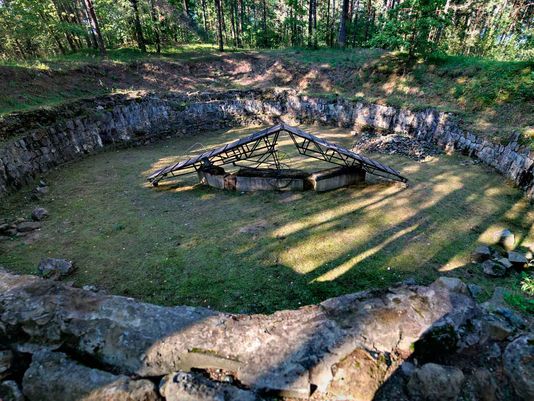
A tunnel that was dug by Jews to escape Nazi death squads has been unearthed in Lithuania, according to a team of archaeologists from the United States, Israel and Canada.
The tunnel was dug in 1944 by prisoners being held in a pit at the Ponary killing fields outside Vilnius, Lithuania. They were brought over from the Stutthof concentration camp, in what is now Poland, for the purpose of digging up the mass graves at Ponary, where an estimated 100,000 people had been killed there since 1941. They were ordered to take the bodies — most of them Jews ripped from Vilnius and other Jewish enclaves– and stack them into pyres and burn them, in an effort by the Nazis to hide the atrocity from the advancing Soviet forces. For this, they were known as the “Burning Brigade.”
At night the Nazis kept the prisoners in pits, and that’s when a group of about 80 decided to take matters into their own hands. Using their bare hands, spoons and anything else that could be used as a tool, they spent three months making a tunnel.
Forty prisoners were able to escape, according to reports. Most, however, were shot by Nazi guards who tracked them down. Only 11 reached the nearby forest and were able to survive. But their testimony let the world know the horrors of Ponary.
Researchers had been searching for the tunnel for decades, but they were only able to locate its mouth in 2004, according to the New York Times. The team of archaeologists was able to finally discern the path of the 115-foot-long tunnel using technology, normally used in mineral and oil exploration, that scans beneath the ground using sound waves.
Although the majority of the estimated 100,000 massacred at Ponar were Jews, victims also included Russian prisoners of war and Polish intellectuals. The region around Vilnius, before the horrors of World War II, was a thriving Jewish cultural center.
For many Jews the uncovering of the tunnel resurfaced many emotions. “As an Israeli whose family originated in Lithuania, I was reduced to tears on the discovery of the escape tunnel at Ponar. This discovery is a heartwarming witness to the victory of hope over desperation,” Jon Seligman of the Israel Antiquities Authority told Jewish Business News.
(c) 2016, The Washington Post · Melissa Etehad


